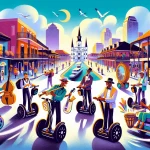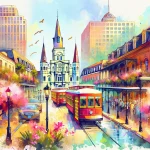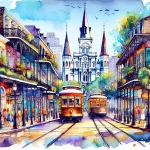New Orleans, a city renowned for its captivating cultural blend, serves as a captivating destination for those drawn to the mystical realms of voodoo and the occult. From the lively avenues of the French Quarter to historic neighborhoods, an array of shops beckons visitors with their enticing displays of talismans, herbs, and spiritual paraphernalia.
In This Article
TL;DR
- Voodoo and occult shops in New Orleans offer a unique window into the city’s diverse cultural tapestry, weaving together African, Caribbean, and French influences.
- These shops contribute to the city’s allure and tourism by providing authentic experiences and a wide range of products rooted in centuries-old traditions.
- Visitors can expect to encounter knowledgeable practitioners, handcrafted items, and opportunities for spiritual consultations and rituals.
Historical Context of Voodoo in New Orleans
The origins of voodoo in New Orleans can be traced back to the 18th century when enslaved Africans from West Africa brought their spiritual practices to the region. These traditions, infused with elements of Catholicism and French Creole culture, evolved into a unique form of voodoo that became deeply intertwined with the city’s identity.
Over time, voodoo practices have been embraced and integrated into the local culture, with practitioners passing down their knowledge and rituals through generations, ensuring the preservation of this rich heritage.
Understanding Occult Shops
Occult shops in New Orleans serve as gateways to the mystical realms, offering a diverse range of products and services catering to those interested in the esoteric arts. These establishments are not merely retail spaces but rather sanctuaries where visitors can immerse themselves in the city’s spiritual traditions.
From herbs and candles to amulets and talismans, these shops provide the tools necessary for various rituals and practices. Additionally, many offer services such as psychic readings, spiritual consultations, and even ritual ceremonies conducted by experienced practitioners.
Top Voodoo Shops in New Orleans
Voodoo Authentica
Situated in the heart of the French Quarter, Voodoo Authentica is a renowned voodoo shop that has been a fixture in the city for decades. Founded by a family of voodoo practitioners, this shop offers a vast array of handcrafted items, including dolls, gris-gris bags, and candles infused with spiritual energy.
Visitors can also partake in consultations with experienced voodoo practitioners, who provide guidance on matters of love, prosperity, and protection. The shop’s atmosphere is steeped in authenticity, with knowledgeable staff eager to share the rich history and traditions of New Orleans voodoo.
Voodoo Spiritual Temple
Located in the historic Treme neighborhood, the Voodoo Spiritual Temple is a true sanctuary for those seeking a deeper connection with the spiritual realm. Operated by Priestess Miriam Chamani and her husband, Priest Oswan Chamani, this temple offers a wide range of services, including weddings, baptisms, private lessons, and spiritual guidance.
In addition to their spiritual offerings, the temple houses a shop brimming with authentic potion oils, incense, candles, and other essential items for practicing voodoo. Visitors can immerse themselves in the rich traditions of West African spiritual healing while exploring the temple’s sacred spaces.
Top Occult Shops in New Orleans
Island of Salvation Botanica
Owned and operated by Sallie Ann Glassman, an initiated Voodoo Priestess and one of the few Americans ordained into traditional Haitian Vodou, Island of Salvation Botanica is a remarkable destination in the city’s occult scene. This shop specializes in a vast array of healing supplies, including incense, herbs, soaps, candles, and essential oils.
Visitors can expect to find a welcoming atmosphere where Glassman and her knowledgeable staff are eager to share their expertise in spiritual healing and traditional practices. The shop also hosts special prayer events, offering a unique opportunity for visitors to immerse themselves in the rich tapestry of New Orleans’ occult traditions.
Haus of Hoodoo
Haus of Hoodoo, a Black women-owned spiritual shop, has garnered a reputation for its exceptional offerings and knowledgeable staff. Owned by Jessyka Winston, this shop boasts a diverse selection of handcrafted items, many of which are created by Winston herself.
Visitors can explore a wide range of products, from candles and incense to ritual tools and spiritual supplies. The shop’s staff is well-versed in the intricacies of hoodoo and other occult practices, providing valuable insights and guidance to both novices and experienced practitioners alike.
Cultural and Economic Impact
The presence of voodoo and occult shops in New Orleans has had a profound impact on the city’s economy and cultural heritage. These establishments not only contribute to the local economy by attracting tourists and generating revenue but also play a vital role in preserving and promoting the city’s unique cultural traditions.
By offering authentic experiences and products rooted in centuries-old practices, these shops help to educate visitors and foster a deeper appreciation for the rich tapestry of New Orleans’ spiritual heritage. This, in turn, has a ripple effect on the city’s tourism industry, drawing visitors from around the world who seek to immerse themselves in the mystical allure of the Crescent City.
Ethical Considerations and Authenticity
As the popularity of voodoo and occult practices continues to grow, there is a heightened awareness of the need for ethical sourcing and maintaining authenticity within the industry. Reputable shops in New Orleans prioritize the responsible procurement of materials, ensuring that their products are created with respect for traditional practices and cultural sensitivities.
Shop owners and practitioners also play a crucial role in educating visitors on the importance of respectful engagement with voodoo and occult practices. By fostering an environment of understanding and appreciation, these establishments aim to combat cultural appropriation and promote a deeper reverence for the spiritual traditions they represent.
How to Visit and What to Expect
When visiting voodoo and occult shops in New Orleans, it is essential to approach these sacred spaces with an open mind and a respectful demeanor. Many shops have specific etiquette guidelines, such as refraining from photography or handling certain items without permission.
Visitors should also be prepared to engage with knowledgeable practitioners who may offer guidance or insights into the spiritual practices and products on display. It is advisable to visit during regular business hours and to inquire about any special events or ceremonies that may be taking place during your stay.
Community and Cultural Events
New Orleans is a city that celebrates its rich cultural heritage through a variety of events and festivals throughout the year. Voodoo and occult shops play an integral role in these celebrations, often participating in or contributing to community events that showcase the city’s spiritual traditions.
From workshops and seminars to rituals and ceremonies, these shops offer visitors unique opportunities to engage with the local culture and deepen their understanding of the mystical practices that have shaped New Orleans’ identity. By attending these events, visitors can gain a more profound appreciation for the city’s vibrant spiritual tapestry.
Expert Insights and Future Outlook
To gain a deeper understanding of the voodoo and occult scene in New Orleans, it is essential to seek insights from experts in the field. Experienced practitioners, shop owners, and scholars offer valuable perspectives on the evolution of these practices and the challenges they face in maintaining authenticity amidst commercialization.
As technology continues to advance and cultural interests shift, the landscape of voodoo and occult shops in New Orleans may undergo transformations. However, the city’s deep-rooted connection to these spiritual traditions ensures that these establishments will continue to play a vital role in preserving and sharing the rich heritage that has captivated visitors for centuries.






